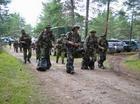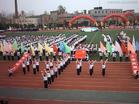1.scare vt. 恐吓
vi.受惊吓
n.惊吓,恐慌
Don’t let the noise scare you; it’s only the wind.
别让那声音把你哧住,那只不过是风声罢了。(scare sb. vt相当于frighten)
He is a man who doesn’t scare easily.
他是一个不易受惊的人。(vi.)
He got a gun and scared off the thief.
他拿了一支枪把小偷哧跑了。(scare off/away…把……哧跑)
What a scare you gave me , appearing suddenly in the dark!
看你,突然在黑暗中出现,把我哧得半死!(n.)
Why won’t you come on the trip? Are you scared? What are you scared of?
你怎么不参加旅行?你害怕吗?你怕什么呢?[be scared of(害怕)相当于be afraid of]
I’m scared to fly in a plane——scared
that it might crash.
我怕坐飞机——因为怕它坠毁。(be scared to do sth.害怕做某事;be scared that 从句)
2.finally adv .最后地;终于;决定性地,彻底地
finally 常用作状语。例如:
The speaker finally managed to get the attention of his audience.
讲话人终于设法吸引住了观众。(终于)
They talked about it for hours. Finally, they decided not to go.
他们谈论了几个小时,最后决定不去。(最后)
It’s not finally settled yet.
那事尚未决定性地解决。(决定性地)
注意:
①finally可用来表示顺序,引出列举各项的最后一项。此时,不可用 at last 与 in the end 替换。
②不可用作感叹语。例如:
At last! Where the hell have you been?
总算找着你了!你到底上哪儿去了?(不可用作finally)
3.advance
(1)v. 前进;进展(move forward or develop)例如:
The soldiers advanced on the enemy.
士兵们向敌人进发。

A month has passed and the work has no advanced.
一个月过去了,可是工作却没有进展。
(2)n. 前进;进展(forward movement or development)例如:
You can not stop the advance of old age.
你不能阻止年龄老化的步伐。
相关短语:
in advance 提前
in advance of 在……前面;比……进步;超过
拓展:
(1)advanced adj. 高级的;先进的
如:advanced education 高等教育
advanced English 高级英语
advance worker 先进工人
(2)advancement n. 前进,进展
4.seize vt. 抓住;逮住;夺取
The weapons found in the house were seized by the police.
在这所房子发现的武器被警察没收了。(依法没收,扣押,查封)
The enemy army seized the city soon.
敌军不久就攻占了这座城堡。(强占)
He seized my hands, shook it, and said how glad he was to see
me.
他紧握着我的手,摇了几下,并且说他真高兴见到我。(抓紧,握紧;take hold of)
He was seized with sudden chest pains.
他胸部突然作痛。(常用被动,侵袭attack)
注意:seize后常接by短语,后接表示抓的具体部位。例如:
He seized me by the hand.
他抓住我的手。(seize sb.+ by+ the+部位,the不可改为one’s或被省略掉)
相当于:He seized my hand.
5.struggle vi. 努力;挣扎;奋斗
n. 竞争;努力;奋斗
He struggled to the surface as the water dragged him down.
水把他往下卷,他奋力挣扎到水面上来。(挣扎)
They struggled against poverty.
他们与贫困搏斗。(struggle against与……搏斗/作斗争)
They struggled for national independence.
他们为民族独立而斗争。(struggle for为……而奋斗/斗争)
We should struggle to overcome our shortcomings.
我们应该努力克服自己的缺点。(struggle to do sth.)
A foreign language is a weapon in the struggle of life.
外国语是人生斗争的一种武器。(n.)
相关词组:struggle to one’s feet 挣扎着站起来
拓展:
struggle可与不同的介词连用,构成不同的词组。例如:
They struggled through the snowstorm.
他们冒着暴风雪前进。(struggle through)
The sick baby cried and struggled in its mother’s arms.
病孩哭闹着,在母亲怀里挣扎着。(struggle in…)
The lamplight struggled out through the fog.
灯光勉强透过迷雾照过来。(struggle out through…)
派生词:struggling adj. 奋斗的
6.flow vi.& n. 流动
The stream flowed along rapidly.
溪水畅流。

Blood was flowing from his wound.
血从他的伤口流出。
The cars flowed in a steady stream along the main road.
汽车在干道上不停的驶过。
As the ladies drank their tea, conversation began to flow.
女士们在喝茶,话题也滔滔不绝起来。
That’s a rich city; money flows like water there.
那是一个富裕的城市,金钱有如流水,到处都是。(充满)
Her thick wavy hair flowed over her shoulders.
她浓密的波浪式头发垂在肩上。[(头发,布)飘拂]
The flow of the River Nile is at its fastest in the late summer.
在夏季末,尼罗河的流速最快。(n .流速)
注意:flow 是一个规则动词,它的过去式、过去分词分别为:flowed; flowed.
而fly(v.)的过去式、过去分词则分别为:flew, flown,不可混淆。
即:flow—flowed—flowed—flowing (现在分词)
fly—flew—flown—flying (现在分词)
7.strike vt. & vi. (struck, struck/stricken)
击打;打动
n .击打;打动
用法:strike用法较多,主要掌握以下用法:
He was so angry that he struck him on the nose.
他是那么的生气,以至打了他的鼻子。(struck sb. on the+身体部位,打在某人某个部位)
They were struck silent.
他们愣住了。(突然/意外的成为)
A bullet struck him dead.
一颗子弹把他击毙了。(击中)
I struck a match and held it to his cigarette.
我擦了根火柴递过去给他点烟。(strike a match 擦火柴)
The clock is striking four.
钟在敲四点。[(钟)敲响报(时)]
He was struck (down) by illness.
他病倒了。[(疾病)侵袭,harm suddenly]
My friend was struck by a snake.
我的朋友被蛇咬伤了。(咬伤,抓伤)
What struck me most was the beauty of the West Lake.
给我印象最深的是西湖的美景。(给……以印象;打动,感动)
It struck me that we ought to make a new plan.
我突然想到我们应当重新作出安排。(突然想起,come suddenly to the mind of sth.
strike sb.某人突然想起某事)
The workers struck for improving the working conditions.(罢工)
工人们为了改善工作环境而举行罢工。
相当于:The workers went on strike for improving the working conditions.
注意:go on strike 进行罢工(指动作)
be on strike 在罢工(指状态)
比较:beat, hit, strike 和knock
(1)beat指用力地打,痛打,跳动,还可以表示“打败”,如:
The landlord beat the farmhand heavily. 地主毒打长工。
The Iraq army was beaten. 伊拉克军队被打败了。
(2)hit打击,袭击,打中,如:
An earthquake hit the district. 这地区受到地震的袭击。
One of the stones hit the window.有一块石头打中了窗户。
(3)strike通常指一下一下地打或敲击,留下印记等,如:
Strike while the iron is hot. 趁热打铁。
The clock is striking 12. 钟在敲12点。
(4)knock指敲打并伴有响声。它还有“打倒、打翻”的意思,如:
Someone is knocking at the door. 有人敲门。
He knocked the girl down. 他把这女孩撞倒了。
8.destroy vt. 毁环;破环(put an end to the existence
of sth.)
The enemy destroyed the city.
敌人毁了城市。
You have destroyed my life and all my hope.
你毁了我的一生和我的一切希望。
The dog is mad and ought to be destroyed.
这只狗疯了,应该杀掉。
比较:destroy/damage
damage意为“损害,损失”(cause loss/harm to),只表示对某物有所损害或损失,但某物仍旧存在。
destroy意为“毁坏,破坏”,用来指完全地摧毁了某物,而某物也不存在了。
例如:
Do away with the bad habits that might damage your health.
去掉那些有可能损害你健康的坏习惯。(cause damage to, n.)
9.fear n.[C & U] 害怕;恐惧;担忧
(1)have a great fear of 对……很害怕
I have a great fear of snakes. 我非常害怕蛇。
(2)in fear of 害怕;担心
I'm living in (daily) fear of dismissal (解雇).
(3)for fear of / that 以防;以免
She asked us not to be noisy, for fear of waking the sleeping
baby (=for tear that we might wake the sleeping baby).
她叫我们别吵闹,以免吵醒了睡着的孩子。
10.touch vt. & vi 触摸;(使)接触;感动
n.接触,联系
Don’t touch that paint; it’s wet.
油漆未干,请勿接触。(接触)
The matter touches your interests.
这事关系你的利益。(关系,涉及)
The story touched all of us.
这个故事使我们都很感动。(相当于:All of us were greatly touched by the story.)
The painting were not touched by the fire.
画未被火所毁。(destroyed/damaged)
No one can touch him in mathematics.
数学方面无人能比得上他。(匹敌,赶得上)
I felt a touch on my arm.
我觉得臂上有人摸了一下。(n .[C]触摸)
The blind have a keen touch.
盲人有敏锐的触觉。(n .[C]触摸)
The ball is out of touch.
球已出边线区。(out of touch在……区域之外)
They can read by touch.
他们通过手摸来阅读。(by touch)
相关词组:
be in touch with 与……有联系(指状态),例如:
He is well in touch with the secrets.
他熟知这些秘密。[be(well)touch with sth.]
Are you in touch with Smith nowadays?
目前你和史密斯有接触吗?(be in touch with sb.)
keep in touch with 与……保持联系(指状态),例如:
I have kept in touch with him since we separated.
自从我们分手以来,我一直与他保持联系。
get in/into touch with 与……取得联系
If you want much more information, get in touch with them in
time.
如果你想得到更多的信息请与他们及时联系。
be out of touch with 与……失去联系
We have been out of touch with them for about two years.
我们大约两年没有和他们联系了。
lose touch with与……失去联系
Write as soon as you can. I don’t want to lose touch with you.
尽可能常给我写信,我不希望和你失去联系。
辨析:touch/feel
touch指“触摸”的短暂动作。主语可以是有生命的,也可以是无生命的。如:
The mountains seem to touch the clouds.
群山似乎触及云霄。
feel则强调“抚摸,摸索”的过程,常与for/after连用。如:
He felt along the wall for the door.
他沿着墙摸索门。(feel…for…摸索某物)
另外,feel还可用作系动词,后接形容词作表语,touch则不行。例如:
He feels the silk and it feels soft.
他抚摸着丝绸,丝绸摸起来很柔软。(vt.抚摸;link v.)
不可写为:… ,and it is felt soft.
1.take place 发生,产生
用法:同happen相近,但侧重点不一样。
take place通常指偶然发生或者经过计划安排而产生或者发生的事情。happen则常指偶然性地发生的事情。例如:
When did the explosion happen/take place?
爆炸是在何时发生的?(偶然发生)
When will the sports meeting take place?
运动会将在何时举行?(经过计划安排而发生)

英语中,表示“发生”的单词或词组,如:happen,take place,break out,come about,它们有一个共同的特点,即都没有被动语态和宾语,只作为不及物动词使用。例如下面句子为错句:
China has taken place great changes in recent 20 years. (×)
中国在近20年发生了很大的变化。
或者:Great changes have been taken place in China in recent 20 years.
(×)
应说:Great changes have taken place in China. (√)
比较:take place/take the place of/take one’s place
take the place of表示“代替,接替某人的职务或工作等”,也可写为:take one’s place。例如:
Plastics have taken the place of many materials.
塑料已经取代了许多材料。(take the place of sth.)
Can you take the place of Mr. Wang today? He is sick.(take the
place of sb.)
今天你能顶替王先生吗?他病了。
此句也可写为:
Can you take Mr. Wang’s place today? He is sick.(take sb’s place)
又如:Prof. White is away on business. So I am taking his place.(take
one’s place)
怀特教授因事外出,我现在代替他的职务。(相当于:……So I am taking the place of him)
take one’s place除了上述讲的可以替换take the place of外,还有以下用法:
①“就席,到某人应去的位置上”,其中one’s与句中的主语指同一个人。例如:
Now, everybody takes his place. The show will begin in a minute.
好了,大家各就各位,演出马上就要开始了。
Take your places for the next dance.
就位,准备下一个舞蹈。
②认为,当然
The new work will take its place among the most important painting
of this century.
这新作品会被认为是本世纪最重要的作品之一。(be considered as being)
2.on fire 失火
用法:on fire 一般用来指状态。例如:
The kitchen is on fire now.厨房着火了。(be on fire)
辨析:catch fire/set fire to/set…on fire/under fire
catch fire“着火”,常指物体碰上火而燃起来,表示动作。例如:
The little girl was badly burned when her dress caught
fire.
小女孩的衣服着了火,被严重烧伤了。
set fire to sb./sth.“放火烧,点着了……”,常指蓄意放火。例如:
The police hasn’t found out who set fire to the storehouse.(set
fire to sth.)
警方还没查出是谁放火烧了仓库。
set…on fire“某人点了火”,“纵火,放火,”相当于set…fire to…。例如:
Who set the house on fire?
是谁放火烧毁这房子的?
Jim’s a nice boy but he’ll never set
the Thames on fire.
吉姆是个好男孩但他永不会做惊天动地的事。(set the Thames on fire 做惊人的事)
under fire “受人抨击;遭到炮火攻击”。例如:
Some buildings are under fire last night.
一些建筑物昨天晚上遭到炮火袭击。
相关词组:
make a fire 生火
go through fire and water 赴汤蹈火;冒一切危险
play with fire 冒险,做危险的事
3.go through
(1)遭受,受苦,经历(to suffer/experience)
The country has gone/been through too many wars.
这个国家遭受了太多的战争。
(2)通过(to pass through/be accepted by)
The new law has gone through Parliament.
议会已经通过这项新法案了。
The plan must go through several stages.
这次计划必须经过几个阶段。
(3)举行(仪式)
They went through the new marriage service.
他们举行了新婚仪式。
(4)使(某人)成功;(考试)及格;熬过(相当于get through)
Can you go through this examination?
你能通过这次考试吗?
(5)用完,耗尽
They have gone through all the money.
他们已经用光了所有的钱。
(6)仔细检查;全面考虑(研究);搜查
You should go through the items one by one.
你们应该逐条研究这些条款。
1.Before she could move , she heard a great noise, which grew
to a terrible roar.
她还没来得及跑,就听到一个巨大的声音逐渐变成可怕的轰鸣声。
before引导的状语从句常常意为“在……之前”或“还没来得及”。
However, before she could think twice, the water was upon her.
然而,她还没来得及再思考,水已经到了她跟前。
Before they reached the house, a new great wave came, sweeping
down the trees, and sweeping them down too.
他们还没到屋子,又一个巨浪打来,冲倒了树,也冲倒了他们。
2.Tree after tree went own, cut down by the water, which must
have been three metres deep.
一棵又一棵的树被水冲倒、冲断。那水肯定有三米深。
“must have + 过去分词”表示对已发生事情的猜测。在英语中,must, may, can三个情态动词可用来表示对事情的猜测。must意为“肯定”,语气很有把握;may意为“可能”、“也许”,语气把握性不大。两者常用在肯定句中。can意为“肯定”、“也许”,常用在否定句或疑问句中。must,
may, can三者用于表示猜测时,其后面可跟三种不同的动词形式:
(1)跟动词原形表示对现在事情的猜测;
(2)跟be doing 表示对正在发生事情的猜测;
(3)跟have done 表示对已经发生的事情的猜测。例如:
Helen is Lucy’s good friend. She must know Lucy’s e-mail.
海伦是露茜的好朋友。她肯定知道露茜的电子邮件。
We can hear loud voices in the meeting room. They must be quarrelling.
我们可以听到会议室很吵。他们肯定在吵架。
I met Jeff at the gate a moment ago. He can’t have gone to Australia.
我刚才还在大门口见过杰夫。他不可能去了澳大利亚。
3.The next moment the first wave swept her down, swallowing the
garden.
转眼间,第一股浪头把她掀翻在地,并吞噬着花园。
swallowing the garden现在分词短语,在句中作伴随状语,指它所进行的动作与前面的动词sweep的动作同时发生,相当于:
The next moment the first wave swept her down and swallowed the
garden at the same time.
总结:doing sth.相当于:and did sth.at the same time
例如:
The six blind men sat near the road, begging.
这六个盲人坐在路旁,乞讨为生。(相当于…and begged at the same time)
The students entered the classroom, singing and jumping.
学生们唱着、跳着进了教室。
相当于:The students entered the classroom and they sang and jumped
at the same time.
她丈夫抓着她的手,大声对她吼叫着。
Her husband shouted at her, seizing/taking hold of her hand.
在英语中,我们还常用其他形式作伴随状语。
①with+宾语补足语。例如:
The teacher came in, with a book in his hand.
老师进来了,手里拿着一本书。
②形容词短语,例如:
We stood outside the teacher’s office, eager to know the result
of the examination.
我们站在老师办公室外面,期待着考试的结果。
相当于:…and were eager to…
③过去分词短语
Mother walked about the room, worried about my sister’s safety.
母亲在房间里来回走动,为我姐的安全而担忧。
相当于:…and worried about…
4.Wei Bin took out some peanuts and it was fun to see the monkey
eat from his hand.
魏彬拿出一些花生。看着猴子从他手上吃花生,很有趣。
fun 意为“好玩,趣事”,不可数名词,前面不加不定冠词a。
You’re sure to have some fun at the party tonight. 今天晚上你肯定会玩得很开心。
make fun of 意为“取笑”,“嘲弄”。
People make fun of him only because he is wearing such astrange
jacket.
人们嘲笑他只是因为他穿了一件那么奇怪的衣服。
拓展:funny adj. 可笑的,滑稽的
He looks very funny in his father’s jacket.
他穿着他父亲的衣服,看上去很滑稽。